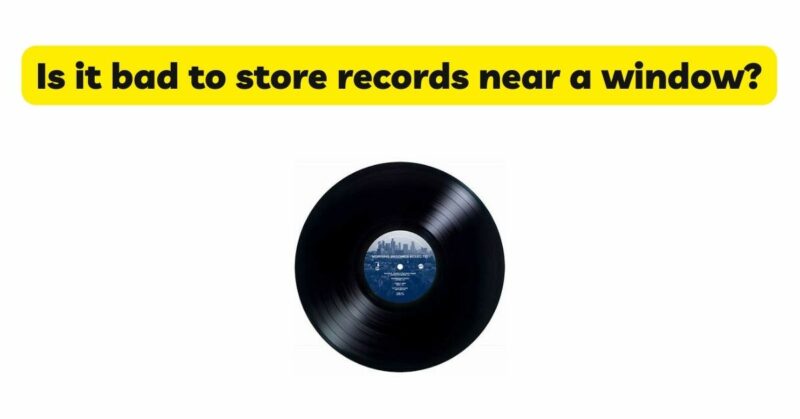Vinyl records have made a remarkable comeback in recent years, captivating music enthusiasts with their warm and immersive sound. Collectors invest considerable time and effort into building and maintaining their vinyl collections. One question that often arises is whether it is detrimental to store records near a window. In this article, we will explore the potential risks associated with sunlight exposure on vinyl records, delve into the science behind its effects, and provide practical recommendations to preserve your cherished collection.
Understanding Sunlight’s Impact on Vinyl Records:
Sunlight, particularly the ultraviolet (UV) rays it emits, can be harmful to a variety of materials, including vinyl records. Understanding the specific risks associated with sunlight exposure is essential to safeguarding your collection.
- Heat: Direct sunlight can generate considerable heat, especially when the sun’s rays directly hit the record’s surface. Vinyl records are sensitive to heat and can warp or soften when exposed to elevated temperatures. Warped records not only affect playback quality but can also damage the stylus and tonearm of your turntable.
- Ultraviolet (UV) Radiation: UV radiation is a major concern when it comes to storing vinyl records near windows. UV rays can cause damage to the record’s protective coating, leading to discoloration, fading, and degradation over time. Additionally, UV radiation can affect the stability of the PVC material itself, potentially compromising the integrity of the record’s grooves and reducing its playback quality.
- Indirect Sunlight: Even if your records are not directly exposed to sunlight, they can still be affected by indirect sunlight. Ambient light in the room can be magnified by reflective surfaces, such as windows, and pose a risk to records placed nearby. Prolonged exposure to indirect sunlight can still result in heat buildup and gradual damage.
Factors to Consider:
- Duration of Exposure: The longer records are exposed to sunlight, the higher the risk of damage. If records are stored near a window where sunlight reaches them for extended periods, the cumulative effects of heat and UV radiation can be more pronounced.
- Intensity of Sunlight: The intensity of sunlight can vary based on factors such as geographic location, time of year, and weather conditions. Regions with intense sunlight, such as tropical or desert climates, pose a higher risk to vinyl records compared to areas with milder or overcast weather.
Practical Tips for Protecting Your Vinyl Collection:
- Choose an Optimal Storage Location: When selecting a storage location for your vinyl records, it is best to avoid placing them near windows or areas that receive direct sunlight. Instead, opt for a cool, dry, and shaded space within your home, such as an interior room or a dedicated vinyl storage unit.
- Utilize UV-Blocking Sleeves: UV-blocking inner sleeves offer an extra layer of protection against harmful UV rays. These sleeves are typically made of materials that filter out a significant portion of UV radiation while allowing visible light to pass through. Using these sleeves can help minimize the risk of discoloration, fading, and damage caused by UV radiation.
- Consider Window Treatments: If you have no alternative storage options and must keep your records near a window, consider installing window treatments such as blinds, curtains, or UV-filtering films. These options can help reduce the amount of sunlight that reaches your records, mitigating the potential risks associated with direct or indirect sunlight exposure.
- Rotate Your Records: Regularly rotating your vinyl records is an effective practice to distribute any potential damage caused by light exposure. By periodically swapping records between storage spaces, you can minimize the impact of prolonged sunlight exposure on specific records.
- Monitor and Control Environmental Factors: In addition to sunlight exposure, factors such astemperature and humidity can also impact the condition of your vinyl records. Aim to maintain a stable and moderate environment for your collection. Avoid extreme temperature fluctuations, high humidity levels, and areas prone to dampness or moisture. Using a dehumidifier or investing in a climate-controlled storage solution can help create an optimal environment for your records.
Conclusion:
While it may be tempting to showcase your vinyl collection near a window for aesthetic purposes, the potential risks associated with sunlight exposure should not be overlooked. Direct and indirect sunlight can lead to heat damage, warping, discoloration, and degradation of the protective coating and PVC material of vinyl records. UV radiation, in particular, poses a significant threat to the long-term preservation of your collection.To protect your vinyl records, it is advisable to store them in a cool, dry, and shaded location away from windows. If storing near a window is unavoidable, utilizing UV-blocking inner sleeves, implementing window treatments, and practicing regular rotation can help minimize the effects of sunlight exposure. Monitoring and controlling environmental factors such as temperature and humidity are also crucial for maintaining the overall condition of your collection.By taking these practical precautions, you can ensure the longevity and enjoyment of your vinyl records, preserving their value as both cherished musical artifacts and sources of timeless audio quality.


